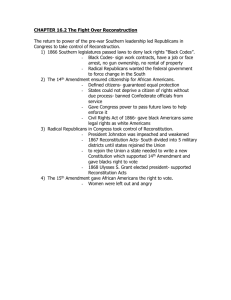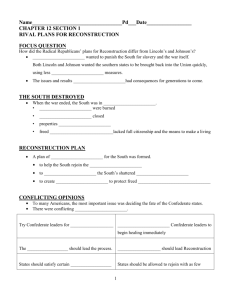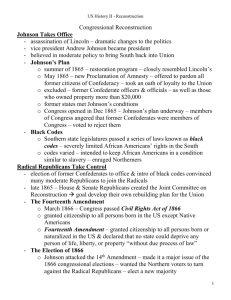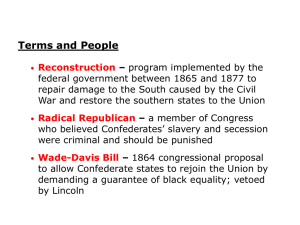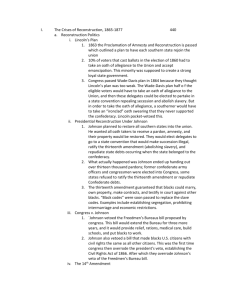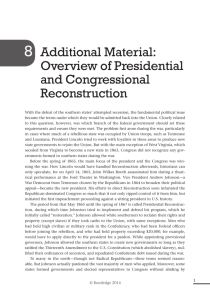SSUSH10 - LessonPaths
advertisement
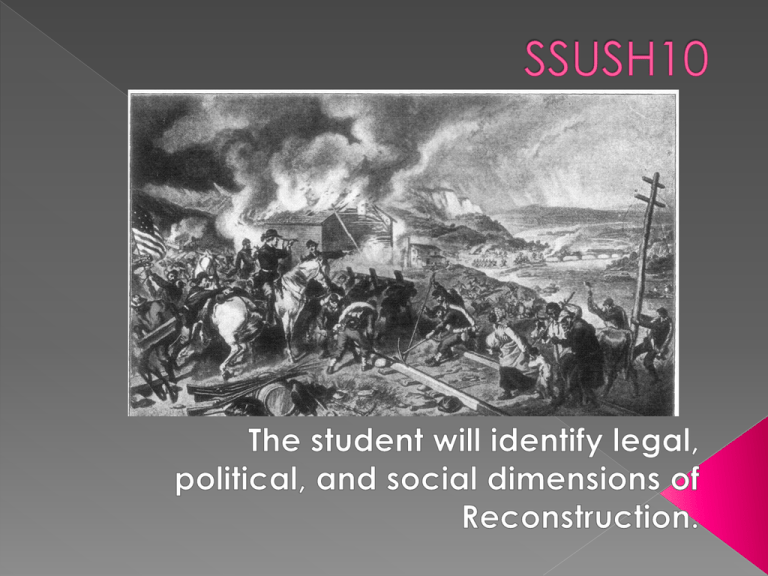
Reconstruction: rebuilding of the South from 1865-1877. After the war, the South needed to be rebuilt physically, economically, and politically. Reconstruction was the rebuilding of these systems after the war. Lincoln began planning for Reconstruction during the war. VP Andrew Johnson who succeeded Lincoln attempted to carry on his plan: -would offer a general amnesty to all Southerners who took an oath of loyalty and accepted the end of slavery. -When 10 percent of the state’s voters took the oath, the state could organize a new state government. -Lincoln’s plan was very lenient and was intended to make it easy for the South to rejoin the Union. Johnson became President after Lincoln’s assassination in 1865. Johnson plan for Reconstruction went against Radical Republicans. He began to allow Southern states back into the Union after they ratified the 13th Amendment. He required a presidential pardon for many former Confederates, but began to pardon many former leaders and many were then elected to the US Congress. Republicans in Congress offered their own plan for Reconstruction: -Wanted to prevent Confederate leaders from regaining power after the war. -Install the Republican Party in the South. -Wanted the Federal government to help African Americans by giving them the right to vote. The Radical Republican plan was much harsher on the South. Many former slaves expected the federal government to give them land as compensation for slavery. Union General William Sherman encouraged this expectation in 1865 by granting a number of freed men 40 acres each of the abandoned land left in the wake of his army. Congress overturned this decision and the sharecropping system emerged. Sharecropping was a system where black families would rent small plots of land in return for a portion of their crop, to be given to the landowner at the end of each year. Congress in an effort to aid the former slaves formed the Freedmen’s Bureau. The Bureau was in charge of feeding, clothing and finding jobs for the former slaves. The Bureau also played a major role in establishing schools for freedmen. 13th Amendment: Passed by Congress in 1865, it banned slavery in the US. Southern states had to ratify the 13th Amendment to rejoin the Union. 14th Amendment: Passed by Congress in 1866, it granted citizenship to all people born or naturalized (including former slaves) in the US. Southern States had to ratify the14th Amendment in order to rejoin the Union. 15th Amendment: Ratified in 1870, the right to vote cannot be denied “on account of race, color, or previous condition of servitude.” In essence, the 15th Amendment granted suffrage to former male slaves. When Congress reconvened many Radical Republicans were outraged with Johnson’s plan. The new Southern governments began to pass black codes which were laws designed to keep African Americans in a state of slavery. The 14th Amendment was passed in response to the black codes: Johnson was opposed to the 14th Amendment. Republicans began to reverse many of Johnson’s plans. Formed in 1865 by former Confederate officers to: -Fight against Reconstruction -drive out Northern Carpetbaggers -help the Democratic Party regain power in the South Their goal was to restore white control through threats and violence. In 1867 Congress passed the Office of Tenure Act which denied the president the power to remove any executive officer without the approval of the Senate. Johnson removed Sec of War Edwin Stanton from office. The Senate then moved to impeachment proceedings to determine whether Johnson should be removed from office. Congress impeached Johnson, charging him with refusing to uphold the law. Congress came up one vote short of finding Johnson guilty. Johnson remained President, but did not run for re-election in 1868. In 1876 Rutherford B. Hayes was elected President in a highly contested race. Hayes lost the popular votes but was awarded 20 disputed electoral votes as a result of the Compromise of 1877. According to the compromise Hayes would withdraw of all Union troops from the South after he was elected President. After the troops left white Southerners regained control and worked to strengthen segregation.


